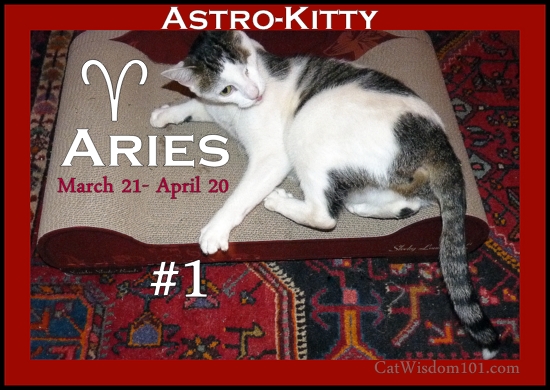Vet 101: The Skinny on Feline Allergies
Spring came early this year to many parts of the U.S. which means, early allergy season. This week’s vet 101 Q & A with Dr. Rich Goldstein answers two readers questions together. Have a question about cat or kittens? Email it (with Vet 101 in the subject line) to layla@laylamorganwilde.com
Q: Do cats get hay fever like humans? Is diarrhea a sign of allergy when given a new food (same flavor but different brand, both good quality canned).
A:Sneezing, runny nose, itchy eyes, scratchy throat. Yup, it’s allergy season (as my itchy, runny eyes and scratchy throat can tell you every time my neighbor’s Cherry Blossom tree blooms…ugh!). But it’s not only humans that can suffer from allergies at this time of year. Cats can suffer too.
Allergies, or allergic reactions, are triggered by substances that the body considers to be “foreign”. These foreign substances can include pollens, different food ingredients, or even viruses. When the body perceives an “invader”, various cells in the body secrete chemicals to call the immune system into action to get rid of it. Sometimes that reaction gets a little out of control, and leads to the signs we typically associate with “allergies”. The most common chemical that the body secretes in an allergic reaction is called histamine, which is why we typically take antihistamines to counteract the symptoms.
Allergic reactions can manifest in many different ways, depending on the body part that is affected. For example, if pollens get into the nose, they can trigger inflammation in the nose, leading to rhinitis (runny nose and sneezing). Irritants or viruses that affect the eyes can cause conjunctivitis. Certain proteins or ingredients in food can trigger intestinal inflammation, leading to diarrhea and vomiting. (Inflammatory bowel disease, or IBD, very often has a food allergy as its underlying cause, which can often be managed nutritionally with limited ingredient diets).
Controlling the symptoms of an allergy is very important. Uncontrolled allergic inflammation can lead to many secondary problems, including infections, which become very serious. Identifying and avoiding the trigger (like that dreaded Cherry Blossom tree, or certain food items) can be very important. Anti-inflammatory drugs like antihistamines or steroids are sometimes necessary. Special diets can help control food allergies. Some homeopathic remedies can also be beneficial.
Alleviating the symptoms of upper respiratory congestion in a cat is particularly important, since a cat’s nose is essential to their existence. Cats are “obligate nasal breathers” – they need to breathe through their nose. They also need to smell their food in order to be enticed to eat. Many cats respond well to using a cool mist nebulizer to keep the airways clear and moist. It’s important to speak with your vet if you suspect your cat has allergies, and discuss all of the options available (ranging from homeopathic remedies to medications) to keep her symptom-free during allergy season.
Editor’s note: Some cats are very sensitive to any changes in cat food, either flavor or brand. If your cat has diarrhea that lasts more than a day or two, be sure to see your veterinarian to determine the cause. There could be other causes. When switching brands, I like to gradually mix a little of the new brand to the old brand over a few days for a smoother transition.





11 Comments
Vet Net Jobs
We look forward to you lisitng your jobs on vet network, we hope that this information was useful to you and that you get a large amount of applications to your positions.
Oui Oui
we are really lucky not to have had any allergic kitties, it must be really frustrating for all involved.
meowmeowmans
Great post! We’ve had some kitties at the shelter who’ve had allergies.
Katie Isabella
My girl is allergic to something..just as the Admiral was. Poor babies.
Abby
Excellent posting!
purrs
>^,,^<
♥Abby♥Boo♥Ping♥Jinx♥Grace♥
CATachresis
All good info as usual, both for human and pet! lol
Caren Gittleman
thank you for this important information.
Cody suffers from “hot spots” on his head that the vet feels are caused by a food allergy but he isn’t 100% sure about that.
Thankfully he hasn’t had a flare-up since late November, early December. It seems to happen approx every 3 months so I am praying it doesn’t happen again soon.
Brian
That was great info and the pollen is in full swing here!
Ingrid King
A grain-free canned or raw diet can help many cats who suffer from IBD or food allergies. These diets often show better results than the limited antigen approach.
Interestingly enough, the slow transition approach often doesn’t seem to be necessary when switching to a grain-free diet, or changing among different grain-free diets. It also helps, regardless of whether you do the slow transition or just offer the new food straight up, to add a good probiotic.
boomermuse
Ingrid, thanks for reminding me about probiotics. All our cats get a daily dose of Florentero.
Glogirly & Katie
That’s all great to know! My doctor told me (when I went in for a sinus infection) that our mild winter has done a number on people’s sinuses. I bet the same could be said for our pets.
I also happen to be thinking about switching Katie’s food so she gets more protein and less grain. This is a good reminder to take it slow.
; ) Glogirly